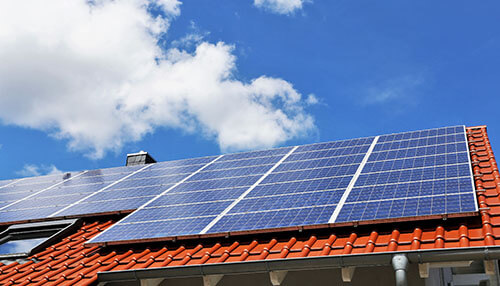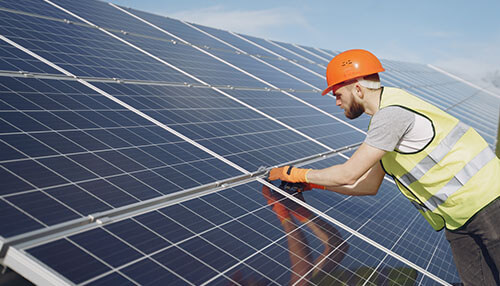When it comes to solar energy, there are many options available to consumers. In this article, we will take a look at the different types of solar financing and help you choose the best option for your business.
What is solar power?
Solar energy is the power produced by the sun. Solar power is one of the most environmentally friendly and affordable forms of energy. It is also one of the fastest-growing sources of energy.
Solar power can be used to generate electricity, heat, or motion. Solar panels are installed on roofs or other areas that receive sunlight to convert solar energy into electricity.
There are a few different types of solar financing options available to homeowners and businesses interested in installing solar panels. The best option for your individual or business needs will depend on several factors, including your location, budget, and expected usage.
If you are considering solar power as an affordable and environmentally friendly alternative to traditional energy sources, there are several important things to consider when selecting a solar financing option.
First, determine your location and climate; this will help you choose the appropriate type of solar panel for your home or business. Next, figure out your budget and expected usage; this will help you identify which solar financing options are best for you. Last, review the various solar financing options available to you before making a decision. You can explore some of the different types of solar financing through https://axximumfunding.com/ and know how they work.
Solar energy types
There are many different solar energy types, each with its own set of benefits and drawbacks. Before making a decision, it’s important to understand the basics of each type so you can make an informed choice.
Here are the main types of solar energy:
– Solar Panels: These are the most common form of solar energy. They work by converting sunlight into electrical energy. Solar panels come in many different shapes and sizes, and they can be installed on roofs or walls.
– Solar Thermal: This type of solar energy uses heat from the sun to create electricity. Solar thermal systems use large mirrors or tubes to focus sunlight onto a water or oil boiler, which creates steam that turns a turbine. This technology is still in development, so there isn’t a lot of information available about it yet.
– Solar PV (Photo Voltaic): This is the most popular form of solar energy currently available. Solar PV works by capturing sunlight and turning it into electricity. It uses thin sheets of metal called modules to collect sunlight and convert it into usable power. Solar PV is usually installed on roofs or walls, but it can also be placed in special locations like parks or fields.
How do solar panels work?
There are many factors to consider when choosing the best solar financing option for your facility, such as the size of the installation, your state’s renewable energy mandates, and your overall financial goals. Solar energy is becoming increasingly cost-effective and viable, making it a great option for facilities looking to reduce their greenhouse gas emissions or save money on their energy bill. Here are a few tips to help you choose the best solar financing option for your facility:
First, decide how much solar power you want to install. A 1-kilowatt system will typically provide enough power for a small business or home, while a 10-kilowatt system is typically needed for larger businesses or homes with multiple appliances.
Next, research your state’s renewable energy mandates. In states with stringent mandates, like California, companies must get a certain percentage of their electricity from renewable sources like solar panels. This will increase the cost of installing solar panels, but it can also mean big savings on your energy bill in the long run.
Finally, think about your financial goals. Do you want to pay off your system over time or do you want to receive a tax break? There are several loan options available
What are the benefits of solar power?
solar energy is the most sustainable and environmentally friendly form of energy generation. It is also one of the cheapest forms of energy, with the upfront cost being reduced over time because of its low fuel costs.
Solar power has many benefits, including:
- Solar power is environmentally friendly – solar panels produce no emissions, so they are good for the environment.
- Solar power is economical – unlike other forms of energy, solar power is relatively cheap to generate and costs continue to drop as technology improves. As a result, it is becoming increasingly popular as a source of renewable energy.
- Solar power is reliable – solar panels always produce electricity, even when the sun isn’t shining. This means that your system can reliably provide power even during periods of darkness or cloudy weather.
Solar installations typically last around 25 years before needing to be replaced, which makes it an affordable and long-term investment.
How much does it cost to install a solar system?
There are many factors to consider when deciding on the best solar financing option for your facility. Below, we outline some of the most important factors to keep in mind:
1. Cost of Solar System Installation: The cost of installing a solar system will vary depending on the size and type of system you choose, as well as your location. However, a ballpark figure for solar system installation costs can range from $6,000 to $20,000.
2. Financing Options: There are a variety of financing options available for solar systems. You can qualify for tax credits and grants, borrow money through a bank or credit union, or invest in a solar lease or power purchase agreement.
3. Feed-In Tariffs (FITs): In addition to financial incentives, some states offer feed-in tariffs (FITs) that increase the rate at which you sell energy generated by your solar panel system back to the grid. This can help offset the cost of installing and operating your solar system.
4. Timeframe: Choosing a timeframe for your solar installation is important because it will impact how much you pay for your system and how long it will take to install.
What are some of the drawbacks of solar power?
Solar power is a great option for many people, but there are some drawbacks to consider before making the switch. Here are four of the most common ones:
- Solar panels can be expensive to install and maintain
- Solar power is not always reliable in cold weather
- Solar power is intermittent, so it requires backup energy sources to keep the system running when the sun isn’t shining
- Solar power is not available in all areas.
Conclusion
When it comes to choosing the right solar financing option for your business, you have a lot of options available to you. Depending on your specific needs and goals, one or more of these options might be perfect for you. Here are four things to keep in mind when deciding which type of solar financing is best for your business:
Your financial goals: Are you looking to pay off your solar loan as quickly as possible? Would prefer not to have any interest payments associated with your loan? Consider an amortization schedule that has shorter terms (such as 12 or 24 months) rather than longer terms (36 or 48 months).
Your credit score: A good credit score can make it easier for you to get approved for a loan. However, there are still plenty of lenders out there who will approve loans regardless of a borrower’s credit score. If this is something important to you, speak with a personal finance expert about how having a good credit score can impact your eligibility for a solar loan.



